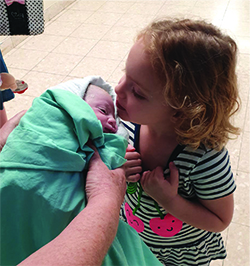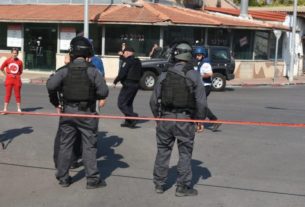Writers never vacation. Their lives consist of writing, or thinking about writing. I like to believe that thinking about writing keeps my mind active, even when relaxing in a comfortable chair.
I remember my paternal great-grandmother, known as “the Bobcha Yehudis” sitting comfortably in a straight-back chair. My maternal great-grandfather sat in a low, faded green, upholstered easy chair in my Baba Chana’s kitchen. As kids, we ran back and forth around the kitchen, conveniently tripping over Great Zaida Shmuel’s feet, warned constantly by an adult in the vicinity to “stop runnin’ around the kitchen, or else…!”
‘);
_avp.push({ tagid: article_top_ad_tagid, alias: ‘/’, type: ‘banner’, zid: ThisAdID, pid: 16, onscroll: 0 });
I don’t think any of my friends had great-grandparents that they remember. My good fortune was grandparents and “greats,” and an uncle who had the vision and courage to leave Europe after World War I. Even if it wasn’t vision, surely it was courage. The ability to face fear takes courage. Fear of poverty and anti-Semitism that engulfed them, fear of leaving home and family to begin a new life in a foreign country, without language skills or knowledge of local laws and customs, or the alien culture they were about to encounter, takes courage. But they did it – on both sides of the family. They held on to their vision, the dream of Eretz Yisrael, and courageously boarded ships that sailed to America, praying their children and grandchildren would remain “ehrliche yidden”, honest good Jews, and that Moshiach would take care of the vision.
My great-grandmother may have hoped her descendants would reach a similar status in life as she did, but surely she never imagined any of her granddaughters slipping off their comfortable chairs to exercise in a park, let alone in Yerushalayim. But daily walks in the park are my New Year’s resolution. To guarantee that this resolution endures, I started ahead of the New Year, following summer vacation on September first, when Israeli children returned to school.
So, a century later, I walk in the San Simon Park in the Katamon section of Yerushalayim, myself a great-grandmother of many blessed great-grandchildren in Israel. I am connected to the past, to generations of antecedents, and I’m also connected to the future, the joy that great-grandchildren create in this world.
Following the brit milah of a great-grandson last week, a great-granddaughter was born this week. The three-year-old sister of the newborn was in the hospital waiting room with her grandparents, waiting for her father to exit the delivery room with her infant sister. I was astonished at the picture sent minutes after the birth – a picture of big sister meeting her minutes-old baby sister.

I remember giving birth in 1962 in Bikur Cholim Hospital in Jerusalem. It was between Rosh Hashanah and Yom Kippur, and a woman who was about to be wheeled into the operating room was held back by her husband and family, while live chickens ran through the hospital corridor. The family was waiting for permission from the head nurse to perform kapparot before the surgery commenced. In 2019, big sister Aviya waited to greet her ten-minute-old baby sister in the corridor of a Petach Tikva hospital; surely an improvement over the Bikur Cholim chickens of 1962!
I circle the park. I discover poles with covered shelves attached, filled with books. A mini-street-library in memory of Shlomit Krugman Hy”d, a 23 year old student of design murdered by terrorists. Her family set up reading posts in her memory, shelves that she had designed, for books that are available to passersby to read on a park bench. “Reading is to the mind what exercise is to the body.” The best way to exercise both physically and mentally is to stop, read, and to take a minute and more to remember Shlomit Hy”d.
Jews have always been known as the “Am HaSefer”, People of the Book. Our holy Torah is the first and most comprehensive book in the world. Yet there are still too many Jews who have never been introduced to the Torah’s “table of contents,” have never learned from the wisdom therein, and will never know how great their loss is. Books are the beginning of real life. The more we read, the more knowledge we acquire, and the greater our ability to succeed.
At age 17, Malala Youszafi from Pakistan became the youngest-ever Nobel Laureate. Her battle for an education, for permission for girls to study and read books, nearly cost her her life. The Taliban’s executioners are still out to murder her. Upon receiving the prize, Malala’s heartfelt thanks went to her father for allowing her to study, for “not clipping her wings.”
Torah study and mitzvah performance, alongside a secular education, was the dream my parents shared for their children. Orphaned of a father at the age of two, my father’s young mother was left without support for her children, and without educational options for them. A penniless widow, my grandmother, Baba Tobey a”h, gave birth to her youngest daughter, and then brought up her children alone, saw them married, and later in life appreciated my parents devoted care for her, as they continued to build Torah true observant families in America, and then relocated to enjoy generations in Israel.
My father never had the opportunity to fulfill his personal dream of “education.” He was a breadwinner at the age of 14. “These are the only years of my life that I really lived,” my father once said, referring to the 12 years he lived in Eretz Yisrael, where he merited fulfilling the dream of a retired balabus, participating in shiurei Torah that he was unable to partake of in his earlier years.
Forty-three years ago, my father was denied entry into the Book of Life; he was not rewarded with the joy of great-grandchildren. His prophetic words to his pregnant granddaughter when she visited him in the hospital one week before Rosh Hashanah, one day before his petirah, “You are carrying my name.” His first great- grandchild, who was born after Rosh Hashanah, is the first Reuven in the family. Papa completed his life in this world at the end of the year, and entered the New Year, l’chayei olam haba.
Books are introduced to our children in nursery school and even earlier. They start drawing and coloring, and are taught about Rosh Hashanah, as the birthday of the world, the period to be inscribed in the Book of Life for the coming year. We pray for a vibrant health-filled prosperous year of life; for 365 good days. What color should that book be? Should it be pink or red? Silver or gold? How do we define desires, thoughts or prayer in color?
I circle the park again. Curvy paths reveal life visible along the nature-colored route. Trees and grass, a cloudless sky, a rising sun, barks and branches, clusters of birds, a few cats and dogs, and many beautiful young children carrying colorful backpacks filled with books on their way to school.
Great-grandmothers find answers, providing the questions are not about physics, math, or technology. They cannot stand on a ladder and hang decorations in the sukkah anymore, or prepare and serve meals for large crowds on Shabbat and Yom Tov. It is often too taxing. But this great-grandma is wise enough to know her limits, to appreciate the ability to bless the etrog and lulav chosen for her by her son, to sit in a straight back chair, instead of a deep sofa, and entertain small units at separate times.
So what else does she do? What should she think when circling the park or relaxing comfortably in her chair?
Perceiving Hashem in this world awakens a desire to distribute blessings for the New Year to all the People of the Book. Hugs from the children and holding a little one in my lap, hearing their songs and brachot, and standing beside them in shul as the shofar sounds, is the greatest source of pleasure. Observing the children running around tripping over my feet – and the blessed ability to write about it, signals continuity, and eternal joy.
<!–
Publisher #16: JewishPress.com
Zone #113: Comment Banner / (02) / News
Size #15: Banner 468×60 (Comments and Mobile) [468×60]
–> ‘);
_avp.push({ tagid: article_top_ad_tagid, alias: ‘/’, type: ‘banner’, zid: ThisAdID, pid: 16, onscroll: 25 });




